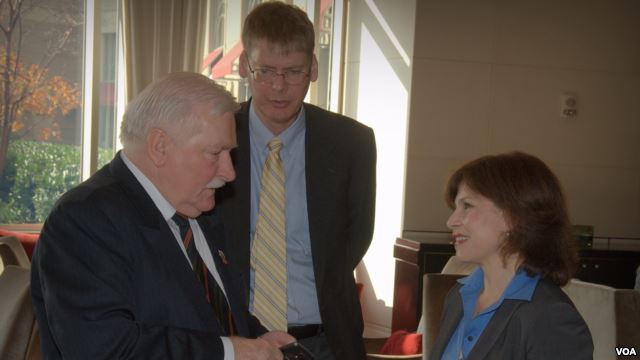
“I would not be the man I am today without VOA,” said Wałesa. “One-third of our victory was due to VOA.”
BBG Watch Commentary
Lech Wałesa: “I would not be the man I am today without VOA. One-third of our victory was due to VOA.”
Two days late and without any substantive news content, the Voice of America (VOA) has finally posted a report on Lech Wałesa’s visit to Washington. The report appeared on the VOA English website in the Arts and Entertainment section. It does not mention Wałesa’s triumphant return visit to the U.S. Congress on Wednesday, which the Voice of America failed to cover. The report also does not include any of the political statements made by Wałesa in the last two days in Washington to other media outlets on topics ranging from President Obama’s leadership in international relations to Russia’s interference in Ukraine and the death of Nelson Mandela. The Washington Post had two long articles about Wałesa’s visit to Washington, one of them in its online blog.
However, credit should be given to VOA’s Vivian Chakarian. She initiated a request for the interview and pushed hard for it after VOA executives ignored Wałesa’s appearance at the U.S. Congress screening of Andrzej Wajda’s movie about him. She ordered two cameras, but getting Wałesa to sit down for a television interview is practically impossible due to his extremely busy schedule in Washington. According to soures, she had to exchange emails with a VOA executive who was wondering whether Wałesa speaks English. She only managed to have a brief exchange with him at his hotel. Had VOA covered the event on Capitol Hill, it could have obtained substantive news information, produced a timely news report and perhaps even gotten a stand-up TV interview with Wałesa. This did not happen.
Doing an arts and entertainment piece on Wałesa two days late is typical for how the Voice of America under the leadership of VOA Director David Ensor and VOA Executive Editor Steve Redisch looks at news coverage.
While Wałesa came to Washington for the screening of a movie about him as Solidarity leader, he is very much a political figure who is highly admired by democracy and human rights supporters in many countries to which the Voice of America directs its programs, including Iran, Russia, Ukraine, China, Tibet, Cuba and many others.
Washington correspondents of numerous media outlets asked him political questions to which he responded. A VOA correspondent had no time to ask such questions because VOA managers failed to plan for the news coverage of Walesa’s visit to Washington.
Had Mr. Ensor and Mr. Redisch been serious about covering news, VOA could have reported Wałesa’s plea for the United States to regain its political and moral leadership in the world. Wałesa said that he was hoping President Barack Obama would succeed in restoring America’s political and moral leadership but concluded that Obama had failed. Without such leadership from America, the world has become dangerous, Wałesa said. The United States should lead and provide ideas rather than engage in military confrontations, he concluded.
Wałesa also said that President Putin needs to be convinced that Ukraine is better for Russia when it is free and economically successful. “There is no Europe without Ukraine,” Wałesa said.
Wałesa also expressed his sorrow at the passing of Nelson Mandela whom he called a “great man.”
Voice of America audiences abroad would have benefited much more from this kind of news coverage rather than from a short arts and entertainment report.
Mr. Ensor and Mr. Redisch should be under no illusion that Wałesa was talking about Voice of America programs as they are today. He was talking about Voice of America programs in the 1980s when the VOA Polish Service engaged in real news reporting and reached over 70 percent of the audience in Poland. Former Voice of America managers like Alan Heil and Ted Lipien would have never allowed reducing Lech Wałesa in VOA news coverage to an arts and entertainment figure because that is not who Wałesa is. They would have had VOA reporters on Capitol Hill where real news was being reported.
Walesa: New Biopic ‘Leaves Out Important Aspects of My Life’
Vivian Chakarian, VOA
December 06, 2013
WASHINGTON — Former Polish president, Lech Walesa says a new movie that portrays his life has left out some important aspects of his life.
“My life is rich in events, and it is not possible to capture it in two hours.” Is the assessment by former Polish president Lech Walesa about the new film based on his life. He spoke in Washington for the launch of Lech Walesa: Man of Hope.
The Nobel Laureate and former Solidarity Union leader spoke briefly to VOA at a Washington hotel.
Walesa said director Andrzej Wajda did a good job of portraying him as a “unionist and simple revolutionary” but said the film left out many important aspects of his life. The activist who led the Solidarity movement in the 1980s that eventually brought down Poland’s communist regime said he was also a politician.
Walesa, the first democratically elected president of Poland, after the fall of communism, also noted what he said was the vital role VOA played in keeping people behind the Iron Curtain informed during the Cold War. He said he listened to VOA a lot.
“I would not be the man I am today without VOA,” he said. “One-third of our victory was due to VOA.”
